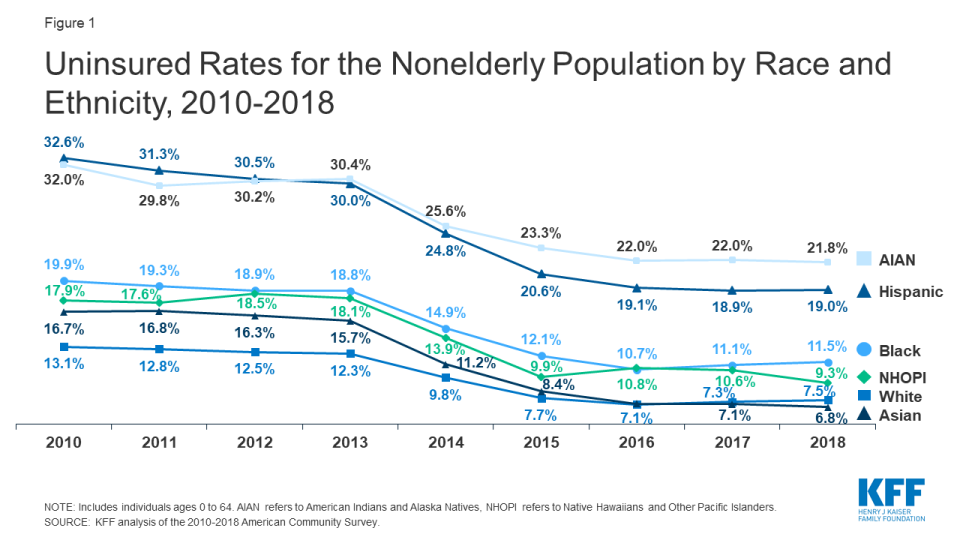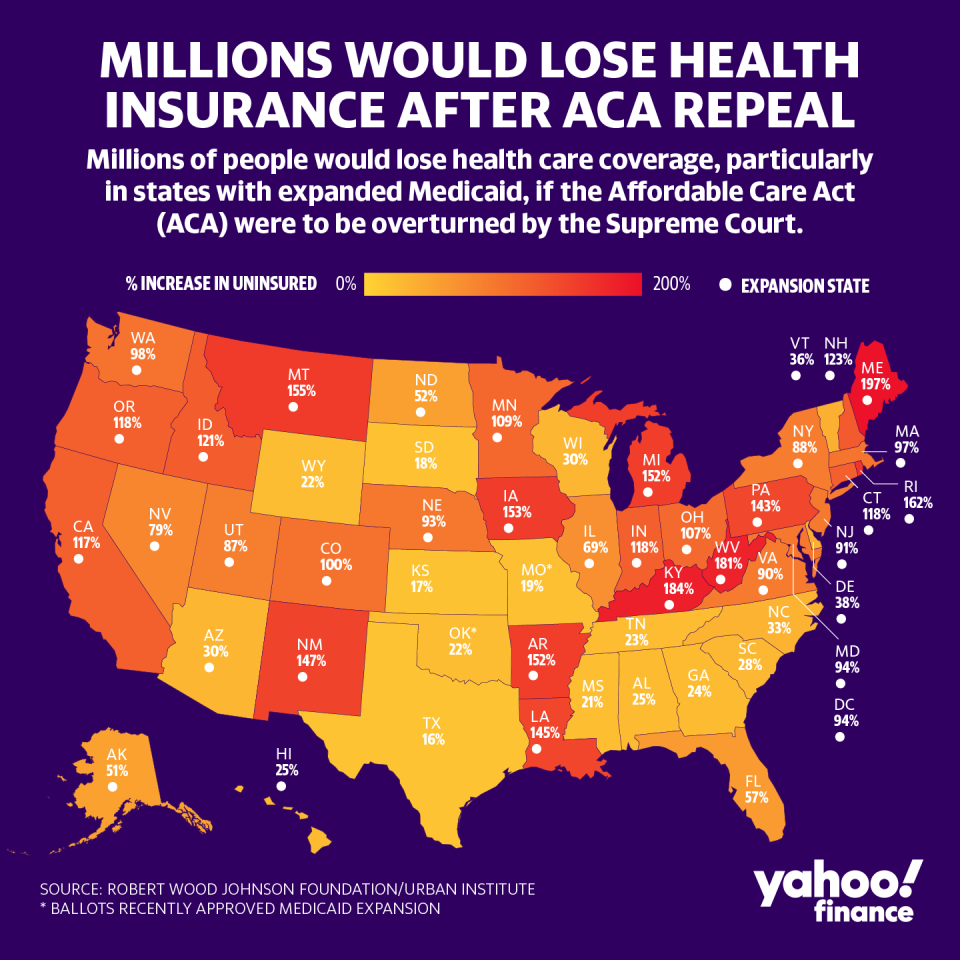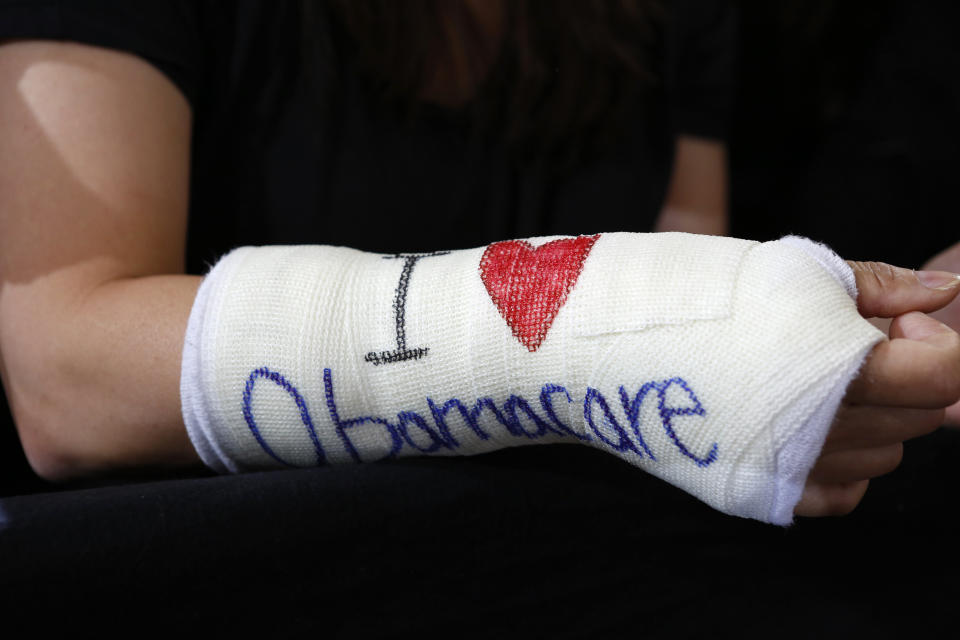Obamacare repeal would be particularly devastating for communities of color
A repeal of the Affordable Care Act (ACA) would wreak havoc for millions of Americans across the U.S., particularly in communities of color.
The Supreme Court is currently weighing the constitutionality of the health care legislation’s individual mandate, and its ruling could either make or break the overall legality of it.
“If the ACA is overturned, it will be devastating for communities of color and other marginalized groups in the U.S.,” Melissa Creary, assistant professor in health management and policy at the University of Michigan School of Public Health, told Yahoo Finance. “While not fully the reform needed in this country, the ACA does provide low cost or free health care coverage for millions of Americans, including POC, and has been shown to improve health at the population level. Taking it away would just exacerbate the health inequities that have been laid bare during the COVID-19 pandemic.”

‘Likely see larger coverage losses’
The ACA, commonly known as Obamacare, expanded health care access to underserved communities and helped fill coverage gaps existing in the U.S. health care system when the landmark health care bill became law in March 2010.
A variety of racial and ethnic groups saw coverage gains under the ACA, with the largest coming through Medicaid expansions and marketplace subsidy expansions. Uninsured rates for Black Americans decreased by over 9% from 2010 to 2016 but have ticked up over recent years. During that same timeframe, Hispanics saw their uninsured rates plummet from 32% to 19.1%.

“What we see is that those coverage expansions really led to large coverage gains across racial and ethnic groups, but particularly large gains in coverage among people of color that helped to narrow those long-standing gaps that we saw in health insurance prior to the Affordable Care Act,” Samantha Artiga, vice president and director of the Racial Equity and Health Policy Program at the Kaiser Family Foundation, told Yahoo Finance. “While those disparities or gaps narrowed, people of color still did remain more likely to be uninsured.”
Going into 2020, there were nearly 29 million people uninsured across the U.S. At least 56% of them are people of color. Social determinants — conditions based on where someone lives, learns, works, prays, and plays that affect health — are a major factor at play here.
“These determinants tend to look differently, overall, from racial group to racial group,” Creary said. “These social determinants affect things like increased exposure to toxins, food insecurity, lack of affordable housing, and inequities in education.”

These social conditions, Creary explained, “have been shown to lead to disparate health conditions when comparing African Americans and whites, including maternal mortality, infant mortality, heart disease, diabetes, cancer, and other health issues. In addition, communities of color (Black, Latinx, and Native Americans) have less access to health care and are less insured when compared to White populations.”
Obamacare included two major coverage expansions that helped to address this: the creation of marketplace subsidies, which are for eligible people that make up to 400% of the federal poverty level, and the expansion of Medicaid.
Losing those coverage expansions would likely lead to large coverage losses, Artiga said, which would be particularly hard among people of color.
“We would likely see larger coverage losses among people of color that would once again widen those disparities in health coverage, which we know has implications for people’s ability to get care, their overall financial protections from high medical costs, and ultimately how healthy they are,” she said.

The role of racism
These health care disparities existed long before the implementation of the ACA.
“The United States and the social institutions within them have been constructed with racial hierarchy as a long-standing influence,” Creary said. “In 1906, sociologist and civil rights activist W.E.B. Du Bois noted that the health disparities of blacks compared to whites in the United States stemmed from social conditions and not from inherent racial traits.”
Research has indicated that people of color are less likely to have access to medical care. In 1995, Black Americans had a mortality rate 1.6 times higher than whites, which is unchanged from 1950.

“I can’t underscore enough the role that racism plays here,” Creary said. “It is a belief system that marginalizes communities across the lifespan, undergirds decisions that politicians make by keeping expansion benefits at bay for their black and brown constituents, and displays itself in countless health care scenarios.”
These existing disparities have drawn the spotlight over the past year as the coronavirus pandemic ravages through communities of color. Latinos have been hospitalized at a rate 4.2 times higher than white Americans, with similar rates for American Indian/Alaska Native persons and Black Americans.
“Despite the recognition and awareness of those disparities, they have persisted over time,” Artiga said. “And I think what we’re seeing now with the COVID pandemic and the racial justice movement is a growing attention to these disparities, but they are not new. They are something that have been present for many, many years.”

And by eliminating the ACA, which has helped to address these issues, it would narrow health care options for these communities, according to Creary.
“It reduces access to valuable mental health services, and will ultimately contribute to the already early deaths we see in certain communities,” she said. “Even with a functioning ACA, the continued high cost of many coverage options means that access to affordable health care is still a challenge for many Americans — particularly African Americans.”
“Now that many states, public health departments, and even the American Medical Association recognize that racism is a problem for the health of all Americans, we should understand that efforts to destroy the health care structures that offer small chances of relief from embodied disadvantage are deeply troubling and cruel,” she added.
Adriana Belmonte is a reporter and editor covering politics and health care policy for Yahoo Finance. You can follow her on Twitter @adrianambells.
READ MORE:
Obamacare enrollment going strong as Supreme Court weighs constitutionality case
Obamacare 'saved my life': Americans warn how devastating ACA repeal would be
Obamacare repeal would lead to more than 21 million Americans losing health insurance, study finds
Read the latest financial and business news from Yahoo Finance
Follow Yahoo Finance on Twitter, Facebook, Instagram, Flipboard, LinkedIn, YouTube, and reddit.
